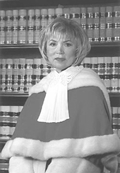With U.S. Lawrence logic, high court says morality can play no role in nightlife regulation
In a 7-2 ruling that is the jurisprudential equivalent of the U.S. Supreme Court’s Lawrence v. Texas sodomy decision from two years ago, the Supreme Court of Canada has ruled that public morality is not a sufficient justification for criminal prosecution of the owners of two Montreal establishments that facilitated group sex activities.
Vacating the criminal convictions of Jean-Paul Labaye and James Kouri, the court ruled that only objective harm to society or the individual participants could justify criminal sanctions.
Labaye operates Club L’Orage, a “swingers club.” As described by Chief Justice Beverley McLachlin in her opinion for the court, the club is a three-story building to which admission is afforded only “members” and their guests. Becoming a member requires responding to some questions at the door to ascertain that one knows with what goes on in the club and is not offended by it, and then paying a membership fee. The first two floors of the club consist of bars and lounge facilities. The third floor, which requires passing through a locked door using an access code, is set up as a sex club where group sex activities take place.
Club L’Orage is a heterosexual establishment.
Kouri operates Coeur a Corps, a Montreal bar advertised in newspapers as a meeting place for “liberated couples only.” Admission was available for heterosexual couples who identified themselves as “liberated” to the doorman. According to the court’s opinion, “Every half hour, a black, translucent curtain closed around the dance floor while slow music played for eight to 12 minutes. At these times, up to 70 people, comprising almost 80 percent of the clientele, would be on the dance floor engaging in group sex activities,” which could be observed from a seating area.
Both men were prosecuted under a statute making it a crime to operate a “common bawdy house for the practice of acts of indecency,” and both were convicted. Different panels of the Quebec Court of Appeal affirmed Labaye’s conviction but reversed the conviction of Kouri.
Chief Justice McLachlin wrote for the majority that “indecency has two meanings, one moral and one legal. Our concern is not with the moral aspect of indecency, but with the legal. The moral and legal aspects of the concept are, of course, related. Historically, the legal concepts of indecency and obscenity, as applied to conduct and publications, respectively, have been inspired and informed by the moral views of the community. But over time, courts increasingly came to recognize that morals and taste were subjective, arbitrary, and unworkable in the criminal context, and that a diverse society could function only with a generous measure of tolerance for minority mores and practices. This led to a legal norm of objectively ascertainable harm instead of subjective disapproval.”
The dissenters sharply dispute this account, and charge the majority with a departure from settled precedent. Writing for himself and Justice Louis LeBel, Justice Michel Bastarache asserts that it is appropriate for the state to outlaw conduct that society would disapprove on moral grounds.
On a more mundane level, there is also a sharp disagreement between the majority and the two dissenting justices on whether the activities in these two facilities were sufficiently “private” to meet the majority’s objective harm test, because the majority of the court concedes that performance of sexual acts in public view creates the harm of confronting unwilling spectators with offensive views. The dissenters argued that the commercial nature of the two establishments inevitably made them “public,” not “private,” and scoffed at the “membership” requirements at L’Orage.
But the more significant dispute goes to the underlying basis for prosecution itself.
In Lawrence v. Texas, the U.S. Supreme Court rejected the argument that majoritarian moral disapproval was a sufficient justification for the Texas sodomy law. Writing for the court, Justice Anthony Kennedy discounted the salience of majoritarian morality as a source of criminal law. Dissenting, Justice Antonin Scalia argued that the rejection of moral justifications put in danger all morals legislation and undermined any logical justification for banning same-sex marriages. To judge by the rulings of lower courts since Lawrence, Scalia’s fears were largely unfounded, since state and lower federal courts have rejected challenges to prostitution, obscenity, and solicitation laws that are founded primarily on moral justifications, and many—although, significantly, not all—courts have rejected same-sex marriage claims.
It will be interesting to see whether the lower Canadian courts react similarly to the rulings in Labaye and Kouri, although the marriage issue is no longer in question in Canada—except perhaps in the upcoming federal elections—where court rulings led to a new federal marriage law embracing same-sex couples. Canadian law is also notably more tolerant than U.S. law on many of the subjects mentioned by Scalia.
Montreal has long had a reputation of being a rather “wide open” city in terms of businesses catering to the sexual interests of gay people and straight swingers, and in that sense the prosecutions in these cases were a bit unusual. The court notes that Kouri’s establishment was operating for more than a decade before the police raided the place as a result of the investigation of a complaint from a moralistic citizen. The court’s decision makes it likely that Montreal’s reputation for such activities will surely increase, and the occasional police raids of sexually-oriented establishments may cease.
gaycitynews.com



































